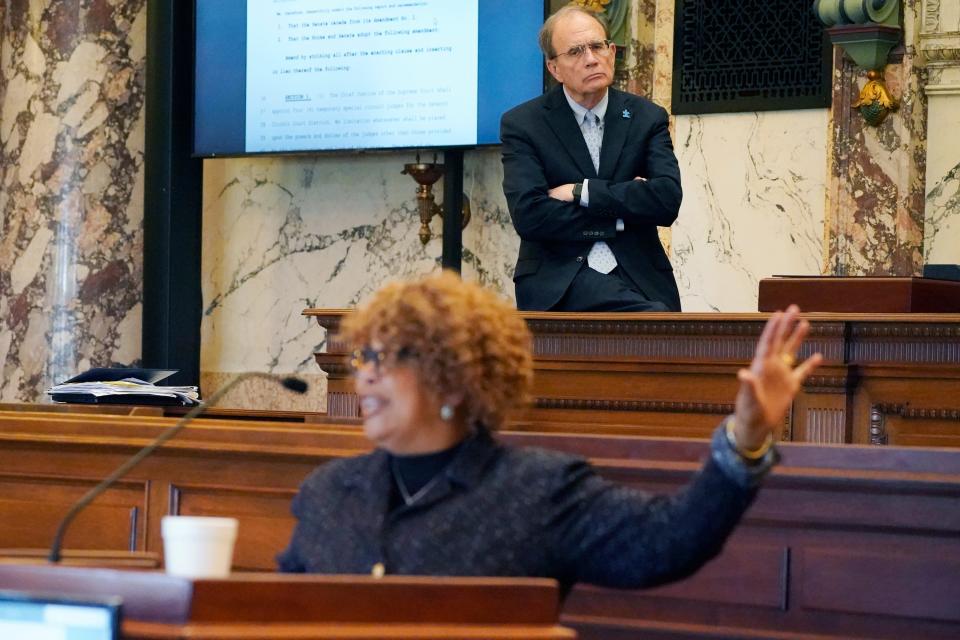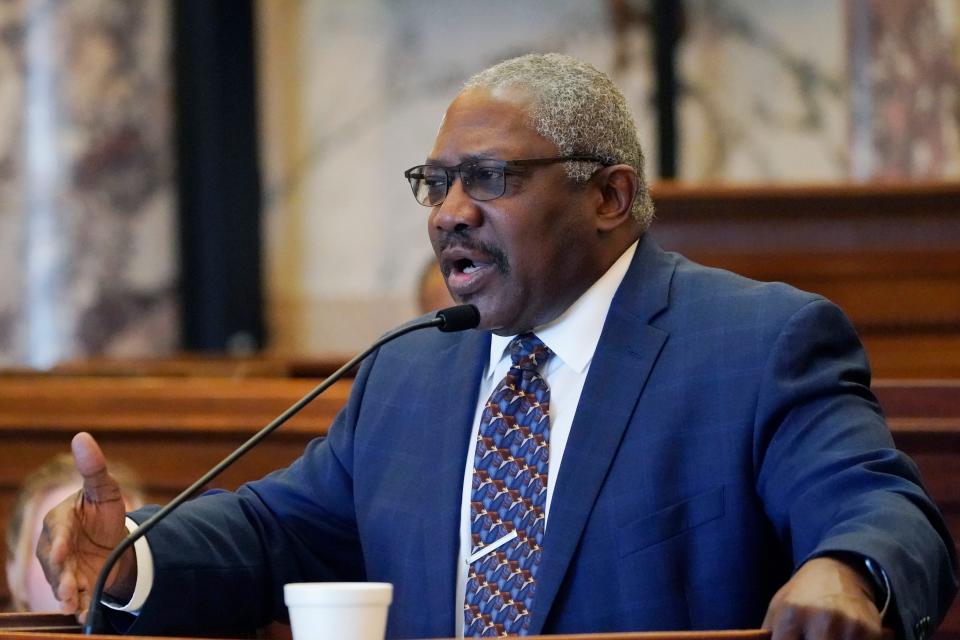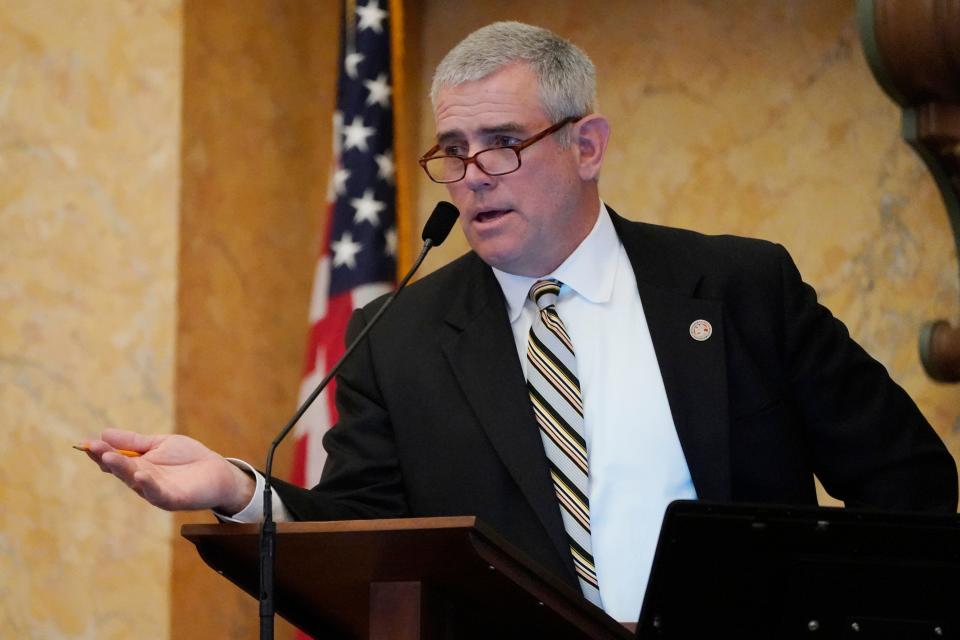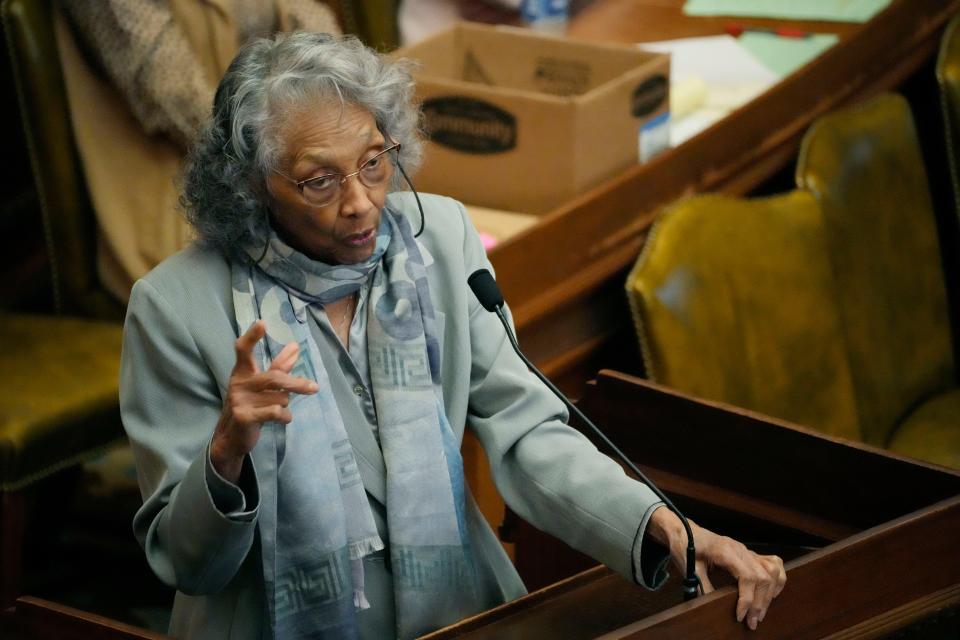A legislative session full of fights comes to an end with some resolved and some still not
- Oops!Something went wrong.Please try again later.
- Oops!Something went wrong.Please try again later.
- Oops!Something went wrong.Please try again later.
The Mississippi Legislature went through a lot of fights this session, which ended in the early hours Saturday.
They fought over the relationship between the state and its capital city. They fought over gender affirming care for transgender youth. They fought over whether to restore the initiative petition process, and whether to extend Medicaid coverage for new mothers. And finally, they fought over the budget.
Here's a look at some of the key battles in from the 2023 session:
Budget fights go down to the wire
It wasn't quite the 2009 budget fight, when disputes between Gov. Haley Barbour and the Democrat-controlled House left lawmakers and Barbour still negotiating a budget just hours before the new fiscal year would begin, but as the clock ticked towards 2 a.m. Saturday, it began to feel like anything was on the table.
As legislators who were not a part of the ongoing negotiations looked for anything to pass the time before their votes were needed, stress balls began to be thrown amongst lawmakers and from the House gallery and on the Senate floor as colleagues reminisced about late nights of sessions past.
And then, just before the clock struck two, both chambers gaveled in, passed the final budget bill — the so-called "projects bill" includes more than $600 million for pet projects of individual lawmakers — and adjourned sine die.
MS response to Trump indictment: Mississippi Congressional delegates respond to Trump indictment. What they said
Legislative Black caucus: How the Mississippi Legislative Black Caucus has changed, served members over the years
In the end, the state passed a budget of $7.615 billion, which included a roughly $120 million increase for K-12 schools, $104 million for struggling hospitals and $18.5 million for tornado relief. If federal funds are removed from the budgets of this year and last, which saw significant COVID-19 relief money, this year's is the largest in state history.
“From a $600 million-plus infrastructure plan to legislation strengthening our elections process, providing options for the continued collaboration of hospitals, and increasing the number of doctors and nurses in Mississippi, the Session has been an overwhelming success," Lt. Gov. Delbert Hosemann said in a statement early Saturday morning.
"The State is in excellent fiscal condition, we are paying off debt, our personal and business taxes are decreasing, and we have adopted a conservative budget which funds necessary services. I am particularly proud of the Senate’s earlier 52-0 commitment to fully funding the education of our children. Our Senators’ leadership on this issue resulted [in funds] for our schools, which will fund local supplements for teachers, classroom supplies, diesel for buses, and all the other things necessary to providing every child in Mississippi with an opportunity for a first-class education.”

The state and its capital city
One of the key themes of the session was attempts by the legislature to assert control over various aspects of the City of Jackson, its capital.
House Bill 1020, which creates an unelected court system within an expanded Capitol Complex Improvement District and increases the jurisdiction of Capitol Police to the entire city, passed both chambers and awaits the signature of Gov. Tate Reeves.
Throughout the session, HB 1020 was heralded by its supporters as a way of reigning in crime in Jackson, while local leaders and most members of the Jackson delegation strongly opposed it saying the majority-white legislature was forcing an undemocratic court system on a majority-Black city.
Another bill that now sits on Reeves' desk would prevent the federally appointed administrator of the Jackson water system from implementing a proposed billing system that would be based on property values. The bill would require municipalities to bill based on accurate metering, or to use a flat rate assessed equally to all ratepayers.
One bill aimed at Jackson that failed was an attempt to regionalize its water system, a move to which Jackson's mayor has long stood in opposition.
Longtime Democratic Jackson Sen. John Horhn said he has never seen the relationship between the state and Jackson as frayed as it is now.

"I will not be long, because I am tired. This has been the most tiring legislative session I've had in the 31 years I've been down here. It's been also one of the most disappointing sessions that I've had when I look at the kind of toxic legislation that's being directed towards me, and when I say me, I mean the people that I represent," Horhn said shortly before the Senate passed the final version of HB 1020.
Postpartum Medicaid extension
A key priority for the Mississippi Senate over the last few years, led by Hosemann and Sen. Kevin Blackwell, R-Southaven, has been to extend Medicaid coverage for postpartum women from 60 days to 12 months.
This year, for the first time, the Senate's bill to do so received a vote in the House, and it passed. That came only after Reeves changed his position to endorse extension, and Division of Medicaid Director Drew Snyder sent a letter to House Speaker Philip Gunn endorsing an extension and stating that it would not be the same as Medicaid expansion. Gunn then stood aside and allowed a vote, though he voted against it.
The bill was signed into law by Reeves two weeks ago and has already taken effect, coming in before a deadline when a federal extension expired.
Helping struggling hospitals
As session was approaching, State Health Officer Daniel Edney warned the legislature that 38 of the state's rural hospitals were at risk of closing — more than half of the total. A later estimate reduced that number to 28, but it remained one of the biggest priorities of session to bring them some relief.
Weeks into session, Hosemann and a group of senators announced a four-part plan to do just that. It included a grant program to provide direct aid, which ultimately would grow in size to $104 million. Another bill would change state law to allow for hospitals to collaborate and consolidate without receiving specific approval from the legislature. The third bill created a loan repayment program for nurses, and the fourth would encourage new rural residency programs.
By the end of session, all four bills passed and now await the governor's signature.
Restrictions on transgender youth
The first bill to both pass the legislature and be signed into law by Reeves this session bans transgender youth from accessing gender affirming care, including gender transition surgeries, hormone replacement therapy and puberty blockers.
Reeves and the bill's supporters said it is an attempt to protect children from procedures they call "experimental" until they are old enough to make informed decisions.
"There is a dangerous movement that's spreading across America today. It's advancing under the guise of a false ideology, and pseudoscience is being pushed onto our children through radical activists, social media and online influencers, and it's trying to convince our children that they are in the wrong body," Reeves said. "This dangerous movement attempts to convince these children that they're just a surgery away from happiness. It threatens our children's innocence, and it threatens their health."
Transgender youth, activists and a number of major medical associations, however, say preventing young transgender people from accessing these procedures is dangerous, especially considering high rates of suicide and depression within the transgender community.
"It has been said this bill is about saving children, but this bill is really about removing the parents' ability to save their own children," Leviathan Myers-Rowell, a young transgender person, said at a February rally opposing the bill. "HB 1125 is in the media and is telling society that there is something wrong with people like me and my parents. HB 1125 will be the reason that more of my community and more of my friends die."
Initiative petition remains in limbo
The legislature once again failed to agree on a bill to restore Mississippians ability to directly pass legislation at the ballot box, which was struck down by the state supreme court in 2021 due to outdated technical language.
Ever since the initiative petition was put in a court-induced coma by the court, the House and Senate have failed to agree on the right way to bring it back. House leaders have pushed plans that would essentially revive the process in the same form it was before, with corrections to the language. A majority of senators, however, have pushed to increase the number of signatures needed for a measure to reach the ballot from about 110,000 to nearly a quarter of a million.
Despite a late attempt to revive negotiations past the usual deadline, the legislature adjourned sine die Saturday morning without an agreement.

The end of an era, or two
For a number of longtime lawmakers and fixtures of the state capitol, Saturday morning marked the end of their legislative careers.
While some veteran senators will be departing, the two biggest departures likely come from the House.
Gunn, who in 2012 became the state's first Republican Speaker of the House in more than a century, steps down as the third longest serving speaker in state history. He was instrumental in passing the state's abortion law, which ultimately saw the fall of Roe v. Wade, and its largest ever tax cut. He was also an early Republican supporter of changing the state flag to remove the Confederate battle emblem, a position which opened him up to significant criticism of segments of his conservative base who began a "Keep the Flag, Change the Speaker" campaign, but in which he ultimately proved successful. As the House prepared to leave early Saturday, members of both parties presented him with a resolution and spoke in his honor, mentioning each of those accomplishments.
Also leaving the House this session is one of its longest serving members, and the first Black woman to be elected to the Mississippi Legislature. Alyce Clarke, D-Jackson, has served in the House for 38 years. Beyond her historic election, Clarke will be remembered for her mentorship to other female lawmakers and for her longtime push to pass a state lottery, which passed in 2018. One of her final actions before the House was to speak in opposition to HB 1020.

This article originally appeared on Mississippi Clarion Ledger: Mississippi Leg. ends 2023 session full of fights and compromises

